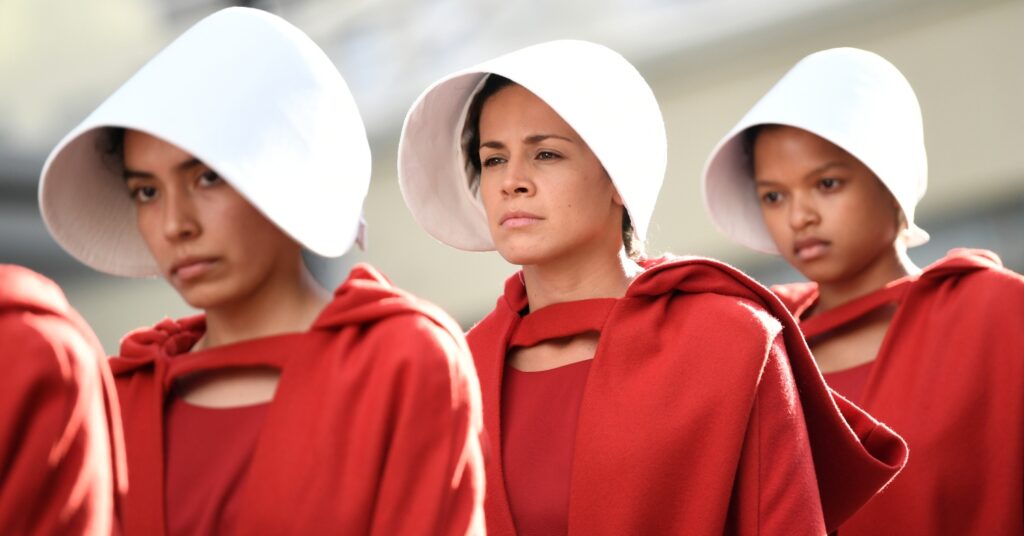Ear-tagged. Tortured with cattle prods. Confined. Raped. Impregnated, and then, newborns taken away from their mothers.
If you’re thinking that sounds familiar — like the premise of Hulu’s hit series “The Handmaid’s Tale” based on Margaret Atwood’s 1985 novel — you’d be right. But it’s not fiction for dairy cows. For those ladies, it’s reality.
Hulu’s third season of “The Handmaid’s Tale” is underway, bringing with it more parallels to modern dairy practices.
“‘The Handmaid’s Tale’ resonates with women who can relate to being seen as nothing more than their bodies,” animal rights group PETA wrote last year. “Cows imprisoned on dairy farms are valued only for their biology, just like the handmaids in the Republic of Gilead. These cows and their daughters endure a lifetime of trauma and misery, while their sons—who are considered worthless to the dairy industry—are often sold for veal.”

The Truth About Dairy Cows
Approximately 9 million dairy cows are raised every year just in the U.S. — and more than half of those live in concentrated factory farms with herds of more than 500 cows each. Some operations see cows number in the thousands.
Like “The Handmaid’s Tale” lead character Offred/June Osborne (Elisabeth Moss), dairy cows have their ears tagged without anesthetic; cattle prods are used to discipline; and rape is routine, with the goal of repeated impregnation. Like humans and handmaids, cows must be pregnant or nursing in order to produce milk, so they’re forced into cycles of pregnancies throughout their lifetime. But unlike the handmaids of Gilead who nurse their children, dairy cows are immediately separated from their calves so the milk can be siphoned off for human consumption.
“These cows’ babies are generally torn away from their mothers within a day of birth, which causes them both extreme distress,” PETA explains. “Mother cows can be heard calling for their calves for days.”
In a recent speech to California students, actress and activist Natalie Portman spoke about how her feminism and veganism intersect.
“Only after I became active in women’s issues did I realize that my veganism was related to those very issues,” she said. “Dairy and eggs don’t just come from cows and chickens, they come from female cows and female chickens. We’re exploiting female bodies and abusing the magic of female animals to create eggs and milk.”
Moira Weigel notes the feminist overlaps that Portman points to, emphasizing the issue brought upon by the men in power and current Trump administration’s anti-choice agendas as demonstrated by the recent anti-abortion legislation passed in states including Missouri and Alabama.
The “most chilling” resonance of “The Handmaid’s Tale” comes from its “vision of a society that compels women to keep reproducing even when it’s become increasingly difficult for them to do so,” she wrote in the New Yorker in 2017. “In the America of 2017, as in Gilead, birth rates are falling, not because of mysterious toxins in the air but because many Americans cannot imagine being able to afford children. Instead of Handmaids, the women most likely to be capable of becoming pregnant are twentysomethings trying to pay off student loans with wages from precarious jobs. (I recently heard one young woman say that she felt ‘sterilized by student debt.’) Others are barren not because of an ecological disaster but because they have worked straight through their childbearing years. Meanwhile, Republicans of today, like those of the Reagan era, continue to push to further privatize the resources that might support childbearing and child-rearing. Consider the remarkable question, posed recently by the Illinois congressman John Shimkus, of why men should subsidize prenatal care.”
“You can’t help what you feel, but you can help how you behave.” – Margaret Atwood’s “The Handmaid’s Tale.”
After a tortured life, it’s an ignoble end for dairy cows, too. While the handmaids of Gilead may find themselves spending out their final days in the Colonies, dairy cows are impregnated until their spent. Then, they meet a gruesome fate.
“Five to six years after they’re born, after their bodies have been broken by a life of incessant pregnancy and lactation, these cows meet a violent death at the slaughterhouse,” PETA writes. Spent dairy cows often end up as low-grade ground beef common in fast food burgers.

A Vegan Market Shift
This doesn’t just parallel with Portman’s feminist comparison, but it speaks to the growing divide between vegans and vegetarians. While vegetarianism — a diet that traditionally includes eggs and dairy — was the diet of choice for the counterculture of the 1960s and ‘70s, today’s Millennial-minded shoppers are moving away from animal products altogether.
Vegetarianism was considered an “ethical” diet choice because milking or taking eggs didn’t take the life of the cow or chicken. But that’s not the case; both animals are sent to slaughter eventually, just like the Handmaids who can no longer conceive.
Consumers are shifting away from eggs and dairy for environmental reasons, too. Gilead is set in a post-ecological-disaster dystopia — a very real scenario that can be linked in large part to the livestock sector; some estimates put the livestock industry at more than 50 percent of all greenhouse gas emissions.
Recent data suggest that the human population could be facing widespread decline by 2050 if measures aren’t taken to thwart the climate crisis.
“Many people say that this is not an easy issue, we cannot just say that this is how it is, it’s not black and white,” Swedish teenager and climate activist Greta Thunberg said in a recent speech. “But I say that this is black and white. Either we stop the emissions or we don’t. There are no gray areas when it comes to survival.”
In “The Handmaid’s Tale” Season One, Offred/June has a moment of clarity — one that dairy cows aren’t afforded. But it’s a moment of clarity that can change how we view our food system and treatment of animals. “Now I’m awake to the world,” she said. “I was asleep before.”


